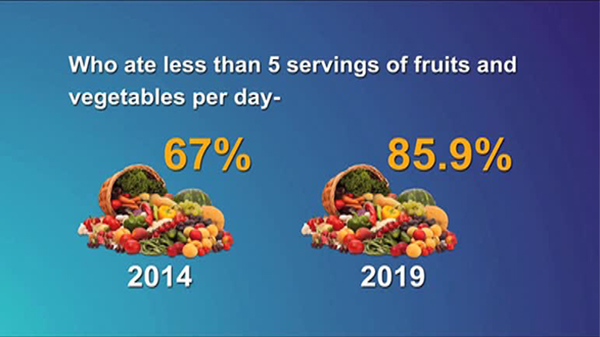 Going by what is reflected in the 2019 STEPS Survey on risk factors of non-communicable diseases, close to 90 % of the Bhutanese were not consuming the recommended five servings of fruits and vegetables. This is an increase from 67 % in 2014. As per the World Health Organisation, five servings is equal to at least 400 grams of vegetables and fruits per day. Scientific research and analysis recommend eating more than five servings of fruits and vegetables per day as it can reduce the risk of heart attack, stroke, cancer, and early death.
Going by what is reflected in the 2019 STEPS Survey on risk factors of non-communicable diseases, close to 90 % of the Bhutanese were not consuming the recommended five servings of fruits and vegetables. This is an increase from 67 % in 2014. As per the World Health Organisation, five servings is equal to at least 400 grams of vegetables and fruits per day. Scientific research and analysis recommend eating more than five servings of fruits and vegetables per day as it can reduce the risk of heart attack, stroke, cancer, and early death.
The STEPS survey revealed that many Bhutanese did not meet the recommended standard of 150 minutes of physical activity every week. More than 85 per cent did not consume enough fruits and vegetables and the average consumption of salt intake of 8.3 grams is still double the WHO’s recommendation of 5 grams per day. All of these varied risk factors are causing non-communicable diseases (NCDs) such as hypertension, cardiovascular diseases, cancers, and diabetes which are on the rise. NCDs are those which are not infectious and usually take a longer duration to progress.
“The most important thing that is coming out of this survey or the biggest challenge that has come out is the eating habit. Our Bhutanese people do not take adequate fruits and vegetables, which are the most important component in a balanced diet. We tend to eat more rice. The portion of the rice we eat is a bit too much. So we are trying to promote the healthy plate concept in which you have to have a colourful plate and on that, you have the food of all classes like carbohydrate, protein, vegetables, and fruits which are part of a balanced diet,” said Dr Karma Lhazeen, the Director of the Department of Public Health with the Health Ministry.
The Director added that the rapidly growing magnitude of NCDs is largely due to changes in lifestyle, dietary habits, and access to an unhealthy diet:
“Access to junk foods, anywhere you go in the market, you will easily find chips, you will easily find bottled juices and alcohol is also available in any departmental store. So these are things that need to be looked at by certain agencies. If we can reduce the availability of such things and then maybe people will be able to change in a way.”
The Global Food Policy Report 2019 reported that food prices in the country have been increasing consistently and is a cause of concern. Health problems related to a lack of balanced diets, including micronutrient deficiencies and lifestyle changes continue to pose challenges in preventing NCDs.
“I think there is an issue of probable affordability of the local produce and all that has to be looked at so that it becomes affordable and probably more people will be able to take more fruits and vegetables which are seasonal and we might be able to address. So our health education will only work if they have access to vegetables and fruits and if they can buy it,” she added.
Very less engagement of local governments, easy availability and access to alcoholic beverages, no strong implementation steps to discourage unhealthy food products and lack of coordination among sectors are some of the challenges that need to be addressed to combat NCDs in the country.
As per the Annual Health Bulletin 2020, NCDs accounted for more than 70 % of the reported deaths in the country last year. Being chronic and needing special treatments, NCDs pose devastating health consequences for individuals and families and burden the overall health system.
Sonam Pem






